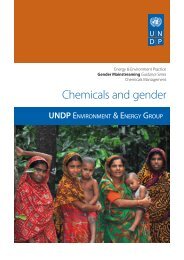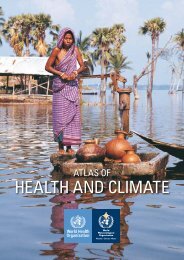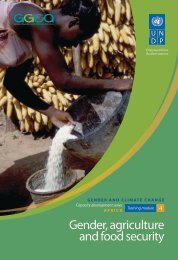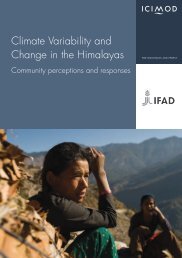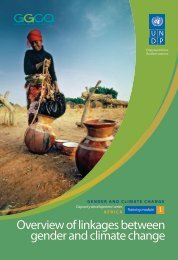jotoafrika - Gender Climate
jotoafrika - Gender Climate
jotoafrika - Gender Climate
Create successful ePaper yourself
Turn your PDF publications into a flip-book with our unique Google optimized e-Paper software.
A male pastoralist fetches firewood in Mandera, Kenya<br />
© Ayub Macharia, 2009<br />
<strong>Climate</strong> change is not gender neutral;<br />
men and women in many communities<br />
interact with their physical environment<br />
in different ways. Vulnerability to the<br />
impacts of climate change also varies<br />
between men and women, for example in<br />
pastoral communities.<br />
<strong>Climate</strong> variability and change (such as<br />
higher temperatures and irregular rainfall)<br />
reduce pasture and water, leading to animal<br />
loss through hunger and disease. This has<br />
been worsened by climate-induced conflict<br />
resulting from resource competition among<br />
pastoralist groups of land users. The risk of<br />
conflict is significantly greater during times<br />
of stress, for example during drought or<br />
floods, when available resources are even<br />
more restricted.<br />
Men are particularly vulnerable to the<br />
direct risks from climate-induced conflicts<br />
over water, pasture and cattle. Among<br />
pastoralists, livestock are very important<br />
and a person’s social status is defined by<br />
the amount of livestock he has. When men<br />
lose their animals, they also lose their social<br />
status and decision-making power.<br />
Alternative livelihoods<br />
The loss of animals threatens the pastoral<br />
system. It creates hopelessness among<br />
pastoralist men and forces them to seek<br />
alternative livelihoods. Many have migrated<br />
to cities to look for jobs, but the majority<br />
do not have the right skills for professional<br />
jobs. Instead they end up working in lowpaid<br />
jobs like security guards. This has led<br />
to a decline in self-esteem and a feeling of<br />
hopelessness because of the loss of social<br />
Organisations and individuals in<br />
Africa can receive a free printed<br />
copy of the briefings. Each issue<br />
is also be available on the ALIN<br />
website (www.alin.net).<br />
Page 6<br />
Changing gender roles<br />
due to climate change<br />
in northern Kenya<br />
Case study<br />
status, from being a rich pastoralist and<br />
decision-maker within the community to<br />
doing manual jobs in cities.<br />
In pastoralist communities, marriage<br />
involves the payment of a dowry to the<br />
bride’s family. However, many men no<br />
longer have enough livestock for this and<br />
opt not to get married. This results in a<br />
breakdown in family structures and an<br />
increase in female-headed households.<br />
Female-headed households are vulnerable<br />
if they have no male members to herd<br />
livestock; the local culture limits their<br />
decision-making and ability to own assets.<br />
Men’s roles within the community are also<br />
changing. Traditionally, it was women’s<br />
role to collect water and firewood.<br />
However, during extreme droughts<br />
men are involved in fetching water and<br />
firewood, especially where the areas<br />
are prone to conflict. Men mostly use<br />
donkeys while the majority of women<br />
carry firewood and water on their heads<br />
or backs, so men tend to fetch firewood<br />
and water in greater quantities. This<br />
means that some can be used within the<br />
family and men can sell the rest.<br />
Recommendations<br />
It is important to recognise the gendered<br />
impact of climate change on pastoralists<br />
and strengthen their existing coping<br />
strategies. Possible responses include:<br />
Governments in countries with<br />
pastoralist communities must put in<br />
place security measures to protect<br />
pastoralists from cattle raiders.<br />
Subscribe to Joto Afrika<br />
You can subscribe by sending an<br />
email to jotoafrica@alin.net. Please<br />
include your organisation and your<br />
full postal address. You can also<br />
subscribe and send feedback via<br />
SMS to +254 717 032322 and start<br />
with the word Joto.<br />
The movement of pastoralists in<br />
response to climate variability reduces<br />
pressure on pasture and water, both<br />
locally and internationally. This should<br />
involve inter-government agreements.<br />
The governments should develop early<br />
warning measures to predict droughts<br />
and inform pastoralist communities.<br />
The Kenyan government should buy<br />
animals before droughts to reduce<br />
animal loss and provide the pastoralists<br />
with money to restock their herds after<br />
droughts.<br />
Nancy A. Omolo<br />
Africa <strong>Climate</strong> Change Fellowship<br />
Programme, University of Kwa Zulu Natal,<br />
School of Environmental Sciences Faculty<br />
of Humanities, Development and Social<br />
Sciences, Durban, South Africa<br />
Tel +27 31 796311215; +254 722620478<br />
nancy.omolo@gmail.com<br />
This project was funded by International<br />
Development Research Centre (IDRC) and<br />
UK International Development Fund (DFID).<br />
See also<br />
‘<strong>Gender</strong> and climate change-induced<br />
conflict in pastoral communities: Case<br />
study of Turkana in northwestern<br />
Kenya’, by Nancy A. Omolo, pages 81-<br />
102 in African Journal on<br />
Conflict Resolution, Volume 10(2),<br />
2010<br />
http://bit.ly/edj3rg<br />
Future issues will focus on<br />
pastoralism and energy. Please tell<br />
us what you think about this sixth<br />
issue of Joto Afrika and what you<br />
would like to read in future issues –<br />
contact details are on page 8.



